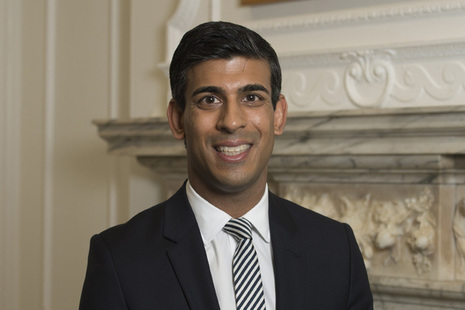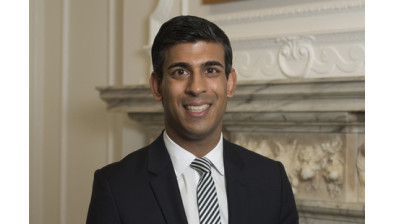Scottish business community welcomes ‘budget for recovery’

Chancellor Rishi Sunak
The Scottish business community has largely welcomed Chancellor Rishi Sunak’s ‘Budget for recovery’ which extended the furlough scheme, froze income tax rates for five years and increased corporation tax to 25%.
The Chancellor announced that the increase in corporation tax would not take effect until 2023. He also revealed that businesses with profits of £50,000 or less, around 70% of actively trading companies, will continue to be taxed at 19% and a taper above £50,000 will be introduced so that only businesses with profits greater than £250,000 will be taxed at the full 25% rate.
Alcohol duties will also be frozen across the board for the second year running saving drinkers £1.7 billion.
At the same time, the reduced 5% VAT rate for the hospitality and leisure sector will continue for a further six months, before increasing to 12.5% for six months and then returning to the normal level of 20% in April 2022.
In a bid to start building the economy of the future, the Chancellor launched a new Recovery Loan Scheme which is open for the rest of this calendar year to businesses of all size and which comes with an 80% government guarantee.
A number of measures were announced to support growth across the UK including funding for three Growth Deals across Scotland (Ayrshire, Argyll and Bute, and Falkirk), and funding to support the North East of Scotland transition to a low carbon future.
According to the Chartered Institute of Taxation, the income tax announcements confirm that from April, Scottish taxpayers earning more than £27,393 per year will pay more income tax than those in other parts of the UK. Below this amount, they will pay less, saving £21 per year.
However, the institute added that the Scottish Parliament agreed to its own income tax plans last week, and there is no reason to believe that these will change as a result of today’s announcements.
Alexander Garden, chair of the CIOT’s Scottish Technical Committee, said that From April 2022, the Chancellor’s decision to freeze the personal allowance until 2026 will apply to all Scottish income taxpayers. He said: “Scots who earn income from savings or dividends will also be impacted by the higher rate threshold freeze from April 2022, because income tax on these is set at a UK-wide level.
“It will be up to the Scottish Parliament to decide whether to replicate the Chancellor’s higher rate freeze in their own devolved income tax plans when they set their own Budget next year.”
Vishal Chopra, KPMG UK’s head of tax in Scotland, labelled the budget as a step in the right direction adding that it was structured around a three-part plan to support people and business, fix public finances and build the UK’s future economy.
Mr Chopra said that the lack of change to the rates of income tax, NIC, or headline rates of VAT was expected, while the freezing of income tax personal allowance and basic and higher rate thresholds will raise more than £319bn in additional tax revenues over this period.
He added that the budget announcement was silent on a number of key areas such as the reform of capital taxes which is widely expected to play a part in addressing the level of public borrowing. But, he said that further changes can be expected on Tax Day’ on 23 March when the Chancellor is to release a package of tax consultations.
Susie Simpson, head of private business at PwC Scotland, argued that the budget was “very much a continuing survival” one. Ms Simpson said the freezes on beer, wine and spirits duty, along with fuel were welcomed for a ‘beleaguered public’. At the same time, she argued many will be hoping to take advantage of the reduced rate of VAT for the hospitality and tourism sector when lockdown ends.
She added: “There was some careful and innovative thinking from Sunak in the form of a deferred corporation tax rise to 25% for the largest 10% of corporates from April 2023 but countered by a new, and potentially complex, marginal relief system to mitigate the impact on SMEs back to current rates in some cases.”
Commenting on the corporation tax increases, Claire Bennison, head of ACCA UK, said that the increases in 2013 may help to raise extra money in the future but in the long term ‘only greater economic growth is going to pay off Covid debts.’
She said: “Some of the Chancellor’s measures will help with growth, but all of them come with administrative costs for the business owners trying to juggle tax alongside every other aspect of their operations.”
She added that the ‘rollercoaster’ of rates and changes in corporation tax in recent years have not helped businesses plan.
Wylie & Bisset has welcomed the Budget’s silence on Capital Gains Tax (CGT) rates and Business Asset Disposal Relief as good news for owner-managed businesses and holders of capital assets.
Catherine McManus, tax partner at the firm, characterised the Budget as the anticipated balancing act, though expressed surprise that, having been bold enough to seek a direct CGT consultation last year, the Chancellor made no changes to CGT.
She said: “As always, the devil is in the detail of the supporting Budget impact notes, though the lack of any changes to CGT rates and Business Asset Disposal Relief will be welcomed by many owner-managed businesses.”
Dr Liz Camerone OBE, chief executive of the Scottish Chambers of Commerce, praised the budget saying that it would help Scottish firms plan with a level of confidence. She added that the extension of the VAT reduction for the hardest-hit sectors and investment incentives respond directly to its calls and will provide much-needed support to Scottish businesses.
However, Ms Cameron said: “Despite the widening of the self-employment support scheme, there are still too many businesses and individuals who have been unable to access any government support. They will require support too if they are to survive the difficult months ahead while the economy remains shuttered.”
Conversely, CBI Scotland heavily praised the new budget with director Tracy Black stating that the Chancellor had gone “above and beyond” to protect UK businesses and people’s livelihoods through the crisis.
She said: “Thousands of firms will be relieved to receive support to finish the job and get through the coming months. The Budget also has a clear eye to the future; to ensure finances are sustainable, while building confidence and investment in a lasting recovery.”
Finance secretary Kate Forbes welcomed the extension of the furlough scheme and self-employed support saying it would be a “relief to many”. However, she said it was extremely disappointing that the Chancellor had “failed to reverse the cuts to Scotland’s capital budget and has refused to make the £20 uplift to Universal Credit permanent”.
She said the UK Government’s support for businesses and households is “significantly less generous” than what the Scottish Government have committed to.
Ms Forbes urged that the additional funding announced for Scotland is not enough, adding that the “storm clouds of austerity are on the horizon once again” with the Office for Budget Responsibility highlighting that departmental spending is being cut by £15bn.
She said she would be meeting with all parties in Parliament over the coming days as the Scottish Government looks towards the final stages of the Scottish budget next week.
Ms Forbes concluded: “I repeat my call to them to come together in a time of crisis to pass a budget that delivers for Scotland.”







